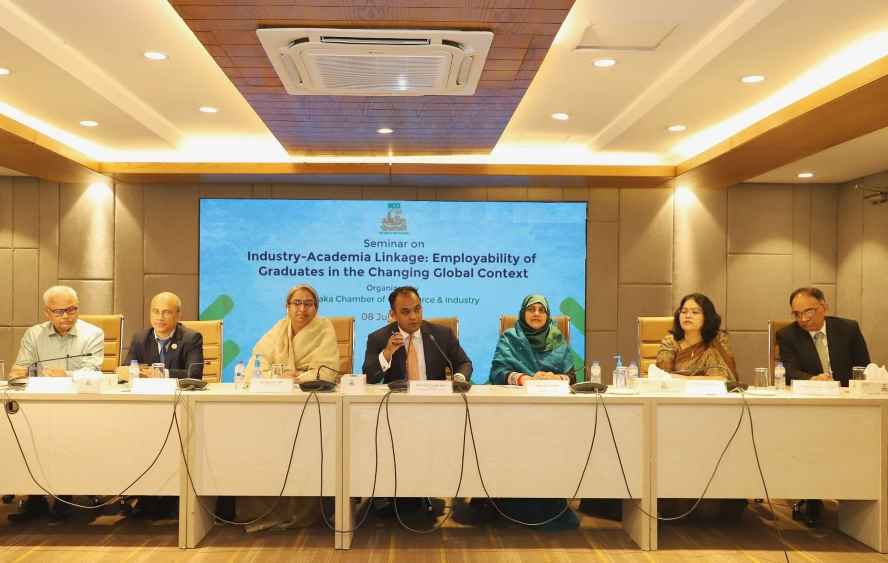
Speakers at a Seminar stressed on industry-academia linkage to reduce skills mismatch in various sectors in the country. They said this while addressing a Seminar on “Industry-Academia Linkage: Employability of Graduates in changing the global context” held on 8 July 2023 in Dhaka organized by the Dhaka Chamber of Commerce and Industry (DCCI).
Education Minister Dr. Dipu Moni spoke at the seminar as chief guest while Executive Chairman (Secretary), National Skills Development Authority (NSDA) Nasreen Afroz spoke as guest of honour that was presided over by DCCI president Barrister Sameer Sattar.
Speaking on the occasion, Dr. Dipu Moni stressed for commercialization of research and development initiatives. She opined that a transformation in the national curriculum system is already visible. She also reiterated for bringing in soft skills, re-skilling and up-skilling, team-work development, technology adaptation, changing of mindset, demand mapping and expediting the Technical and Vocational Education and Training (TVET).
Dr Dipu Moni informed that at present the enrollment rate in the TVET is 17%. She said diversification of education is more important as it will not be the right decision to attract the students only to medical or engineering education system. Rather, she said the students should have a mentality to come into nursing, modern farming, freelancing and other jobs since these sectors have also created a huge demand now a days. In this regard, the Education Minister urged to change the mindset because no occupation is superior to the others.
Nasreen Afroz, Executive Chairman (Secretary) of the NSDA said that the NSDA is keen to create skilled manpower. She also informed that a ‘Skills Qualification Framework’ has been formed under the Chairmanship of the Education Minister. Fourteen (14) skills development councils have already been formed, she informed.
Nasreen expressed her hope that in future the relation between the industry and the academia will be more expedited. She also requested the industry leaders to arrange such workshops and seminars incorporating relevant stakeholders. “NSDA has been arranging funding from the Human Resource Development Fund of the Ministry of Finance for those who are involved in conducting skills development training,” she informed.
Dr. Sayema Haque Bidisha, Professor of Economics, University of Dhaka and Research Director, SANEM presented the keynote paper. She highlighted that one of the challenges of the labor market of Bangladesh is absence of strong linkage between the supply and demand sides- primarily between the academia and the industry. To address the skills mismatch, strong Industry-Academia linkage is needed, she said. By the year 2027, analytical thinking, creative thinking, artificial intelligence (AI) and big data will have more demand. In the future, technology will create more jobs, Dr Bidisha added.
DCCI president Sameer Sattar said in the changing global context and in order to accommodate the graduates to their desired job sectors as per the demand of industries, there are no alternatives but to ensure better collaboration, coordination and synchronization between the industry and the academia to secure the future economic development as well as to reduce the existing skill mismatch.
He also said that Industry-Academia linkage is instrumental in creating a skilled and industry-oriented workforce. “It ensures a workforce – ready with a specialized skills set for the relevant industries but the linkage has still not been fully developed due to our conventional educational system.” Sameer also urged for conducting joint research and development activities, developing education infrastructure, creating a national employment database, arranging need-based curriculum design and skills trainings as well as strengthening TVET. According to a statement, every year $8-10 billion are being remitted from Bangladesh as salary paid to foreign workers, he pointed out.
In the panel discussion session, Professor of Institute of Business Administration (IBA) Mohammad Abdul Momen stressed on need-based curriculum development, development of IT infrastructure, skills training and adopting industry-specific programmes. “Female participation in our industry is very low,”he added. Moreover, he urged to reduce dependency on foreign workers working in different companies in Bangladesh.
Managing Director of Apex Footwear Limited Syed Nasim Manzur requested for private sector representation in the development process of curriculum to ensure quality education.
Vice Chancellor of BUET Prof. Satya Prasad Majumder underscored the importance of having joint collaboration and cooperation between industry and academia. “Industries should come forward with more research and development with their own investment,” he added. Besides, Majumder requested to develop a 4IR policy.
Member of the University Grants Commission (Commission) Prof. Dr. Md. Sazzad Hossain said that the UGC is going to establish an industry-academia platform soon.
Former CFO of Snapchat Inc. Imran Khan said that ICT, innovation, digital marketing and IT outsourcing will create a huge job opportunity for the graduates.
Country Director of ILO Tuomo Poutiainen and Shafquat Haider, Member, Governing Board, NSDA also spoke on the occasion. DCCI Senior Vice President SM Golam Faruk Alamgir (Arman) was also present on the occasion.



